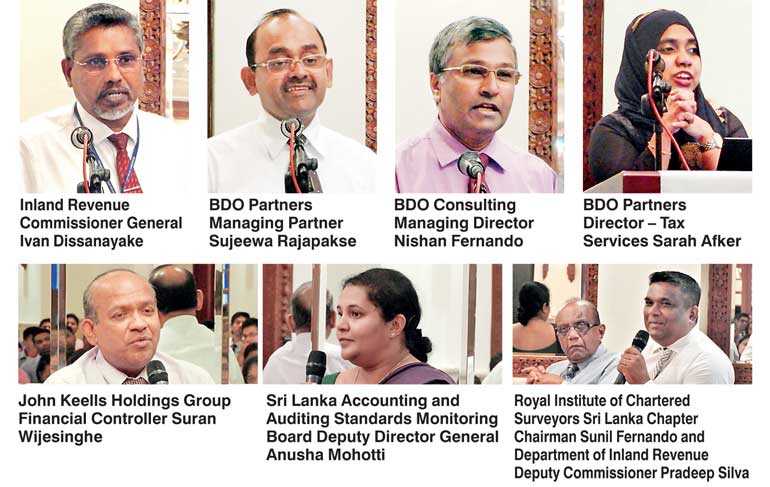Friday Feb 27, 2026
Friday Feb 27, 2026
Tuesday, 12 June 2018 00:00 - - {{hitsCtrl.values.hits}}


BDO Partners Director – Tax Services Sarah Afker, BDO Consulting Managing Director Nishan Fernando, John Keells Holdings Group Financial Controller Suran Wijesinghe, BDO Partners Managing Partner Sujeewa Rajapakse, Sri Lanka Accounting and Auditing Standards Monitoring Board Deputy Director General Anusha Mohotti, Royal Institute of Chartered Surveyors Sri Lanka Chapter Chairman Sunil Fernando and Department of Inland Revenue Deputy Commissioner Pradeep Silva
The new Inland Revenue Act No. 24 of 2017 introduces many key tax regulations which have significant impact on financial reporting. BDO, on 5 June, conducted a seminar under the theme ‘Think Beyond’ titled ‘Strategising financial reporting in the wake of new tax regulations’ aimed at addressing the finance related issues arising out of the new Inland Revenue Act and how finance professionals should respond to such issues.
The event had an overwhelming patronisation by over 200 finance and tax professionals including the Commissioner General of Inland Revenue, senior officers of the Department of Inland Revenue and the Sri Lanka Accounting and Auditing Standards Monitoring Board.
BDO Partners Managing Partner Sujeewa Rajapakse welcomed the gathering and emphasized the need to be aware of the implications on the financial reporting, resulting from the tax regulations in order to abide by it.
Inland Revenue Commissioner General Ivan Dissanayake, addressing the gathering, explained that there had been a paradigm shift in tax regulations with the introduction of the new Act, which came as a change after 11 years. He also said that the new Act would address a diversity of changes which are aimed introducing a more fair and equitable basis.
“This is a rule-based Act and leaves no room for arbitration,” said Dissanayake. “The Act consists of Legal Provisions and Administrative Provisions. There is a Rs. 70 billion increase in tax revenue expected from the proposed changes to the Act,” he continued.
He also explained that the Department of Inland Revenue has introduced new technology to enhance their services and stressed the importance of focusing on good tax governance as his closing remark.
The key presentations were made by BDO Consulting Managing Director Nishan Fernando and BDO Partners Director – Tax Sarah Afker.
Fernando highlighted at the outset, that the finance professionals are now compelled to think strategically in financial reporting as well as financial management, in the wake of the new tax regulations. Fernando and Afker discussed key impact areas such as revaluation and capital gains based on classification of assets, carried forward tax losses, leases, interest expenses and thin capitalisation, research and development, agriculture, repairs and improvements, long-term contracts, change in control, financial instruments and bad debts and the deferred tax implications arising out of them.
It was highlighted that three new international Financial Reporting Standards on financial instruments, revenue and leases had been introduced in the context of which application of the new rules would be more challenging.
The presentations were followed by a panel discussion, moderated by Sujeewa Rakapakse. The panel comprised John Keells Holdings PLC Group Financial Controller Suran Wijesinghe, Sri Lanka Accounting and Auditing Standards Monitoring Board Deputy Director General Anusha Mohotti, Royal Institute of Chartered Surveyors Sri Lanka Chapter Chairman Sunil Fernando and Department of Inland Revenue Deputy Commissioner Pradeep Silva together with the two presenters.
Wijesinghe explained the need for the amendments in the new Act to be more practical and realistic. He highlighted this point using the example of repairs and maintenance which is required to be monitored on an individual asset by asset basis rather than by classes of assets. Silva responded favourably to the comment and said that the Department would look at it in a practically feasible manner.
Mohotti explained their role as a regulator: “As the regulator it is our responsibility to enhance the reliability of financial information. We work to ascertain if the assets and liabilities have been correctly reflected in the financial statements. In the event of any inconsistency or doubt, we call for clarifications from clients. In the event the Regulator is still not satisfied with the explanations, we request the client to amend the financial statements.”
Mohotti further explained the importance of being able to ascertain reliability of the assumptions used in business or property valuations. She assured the audience that as a result of the changes in the tax regulations, if there arose any grey areas that they would contact the Tax Authority and obtain clarifications. She also explained the need for audit firms to have comprehensive audit working papers, as the Regulator may request for it to clarify grey areas by ascertaining the extent of work carried out by the auditor with regard to the same matter.
Fernando agreed with the sentiments expressed with regard to property valuations. He emphasized the importance of engaging professionally competent, independent valuation professionals and also requested regulators to introduce a mechanism to provide feedback about those who perform errant valuations.
The representatives of the Department of Inland Revenue were receptive and positive to the comments made and was keen to provide practically feasible and appropriate resolutions to the matters raised.
It was indeed a timely technical presentation which was an eye opener to many a tax consultant and financial controller.